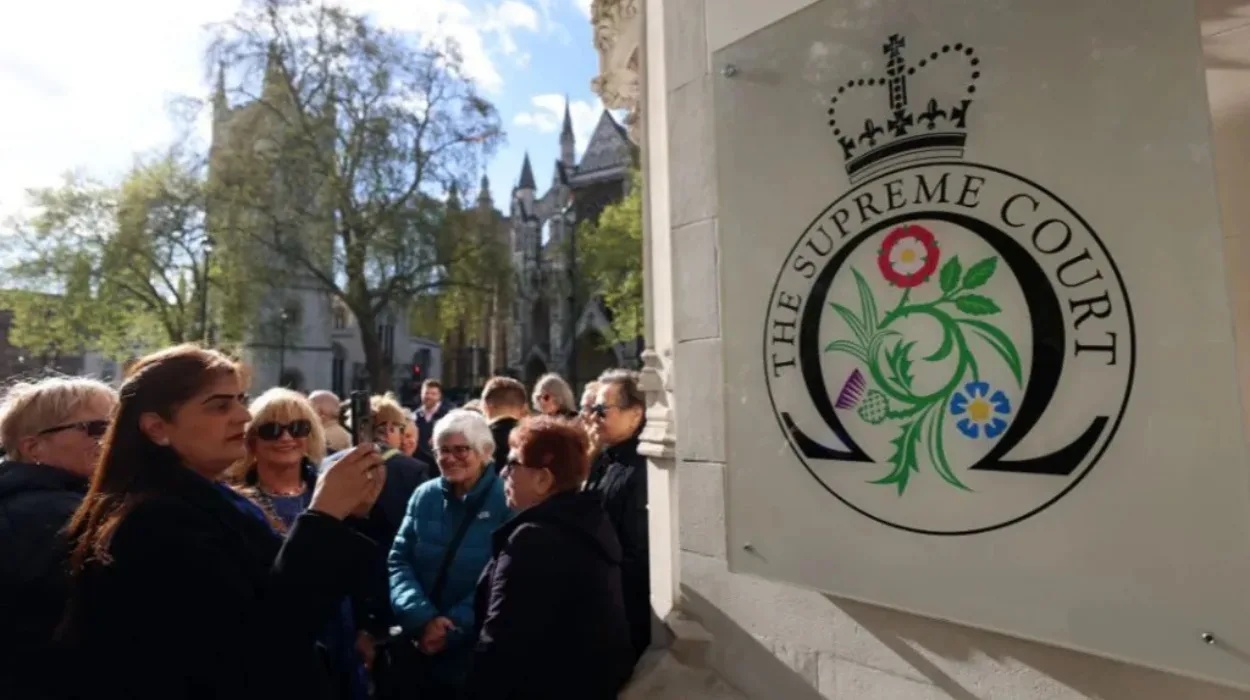UK (Parliament Politics Magazine) – The UK Supreme Court ruled that trans women are not legally female under the Equality Act, backing biological sex in defining access to single-sex rights.
As reported by The Independent, the Supreme Court has issued a landmark judgment ruling that trans women are not legally recognised as women.
For Women Scotland, a campaigning group advocating sex-based rights, challenged the legal definition of “woman” in Scottish legislation requiring 50% female representation on public boards. They claim the change undermines protections based on biological sex.
Supreme Court judges’ stance on the definition of woman
In a unanimous ruling on Wednesday, five Supreme Court judges declared that “woman” and “sex” in the Equality Act are defined by biology. The decision may have significant implications for trans women’s access to services and spaces.
Lord Hodge, Lady Rose, and Lady Simler, in an 88-page ruling, stated that “biological” is absent from the Equality Act’s wording. However, they added that
“the ordinary meaning of those plain and unambiguous words corresponds with the biological characteristics that make an individual a man or a woman.”
According to the justices, interpreting biological sex based on Gender Recognition Certificates would
“cut across the definition of the protected characteristic of sex in an incoherent way.”
The judges argued that transgender people continue to be protected from discrimination, but
“gender reassignment and sex are separate bases for discrimination and inequality.”
What did Jane Fae say about the Supreme Court ruling on trans rights?
Jane Fae, the director of TransActual, a trans campaign group, argued that the ruling will lead to society “dividing more sharply into queer-friendly and queer-hostile spaces,” adding that it will “be the poorer for it.”
The campaigner said,
“The entire trans community is devastated. Irrespective of the small print on this ruling, the intent seems clear: to exclude trans people wholesale from participating in UK society.”
She added,
“This morning, we are feeling very alone. That, though, is today. We have come through worse before, and trans people are not going away. Whatever the non-trans world throws at us, we will be back, each time, stronger than before.”
What did Labour for trans rights say about the Supreme Court’s decision?
In response to the Supreme Court decision, Labour for Trans Rights described it as “hugely disappointing,” arguing that the judgment was influenced by “ceaseless lobbying from a well-funded anti-trans network.”
The group stated,
“Labour must not follow the example of Donald Trump, and must instead protect the Equality Act – one of Labour’s proudest pieces of legislation – and its legal protections for trans people,”
adding,
“The Labour Party must stand firmly behind the LGBT+ community.”
What did TransLucent say about the Supreme Court’s decision on trans rights?
The transgender rights campaign group TransLucent stated,
“Many in the trans community will be extremely worried by this decision and its implications.”
It added,
“We would like to reassure them that they are still protected from discrimination, victimisation and harassment because of their protected characteristic of gender reassignment.”
Scottish government remarks about the Supreme Court ruling on single-sex spaces
During a hearing in November, lawyers for the Scottish Government argued before the Supreme Court that a person holding a Gender Recognition Certificate (GRC) is “recognised in law” as having changed sex.
Following the court’s decision, the government reiterated its support for the “protection of single-sex spaces based on biological sex,” adding that the ruling brings
“clarity and confidence for women and service providers such as hospitals, refuges, and sports clubs.”
A government statement added,
“Single-sex spaces are protected in law and will always be protected by this government.”
Baroness Kishwer Falkner takes on the Supreme Court’s ruling
Baroness Kishwer Falkner, head of the Equality and Human Rights Commission (EHRC), stated,
“We are pleased that this judgment addresses several of the difficulties we highlighted in our submission to the court, including the challenges faced by those seeking to maintain single-sex spaces and the rights of same-sex attracted persons to form associations.”
She added,
“As we did not receive the judgment in advance, we will make a more detailed statement once we have had time to consider its implications in full.”
Kemi Badenoch’s views on the Supreme Court ruling on trans rights
Kemi Badenoch, the Conservative Party leader, used the judgment to slam Prime Minister Keir Starmer, remarking,
“The era of Keir Starmer telling us women can have penises has come to an end.”
She added,
“Saying ‘trans women are women’ was never true in fact, and now isn’t true in law either. This is a victory for all of the women who faced personal abuse or lost their jobs for stating the obvious. Women are women and men are men: you cannot change your biological sex.”
Labour remarks about reforming gender recognition law
Labour has pledged to reform the gender recognition law, calling it outdated and intrusive. The party aims to reform the process to remove indignities faced by trans people. This will ensure they receive the recognition and acceptance they deserve.
Keir Starmer previously stated that trans women with Gender Recognition Certificates do not have the right to enter women-only spaces. He added that spaces for biological women should be protected.


